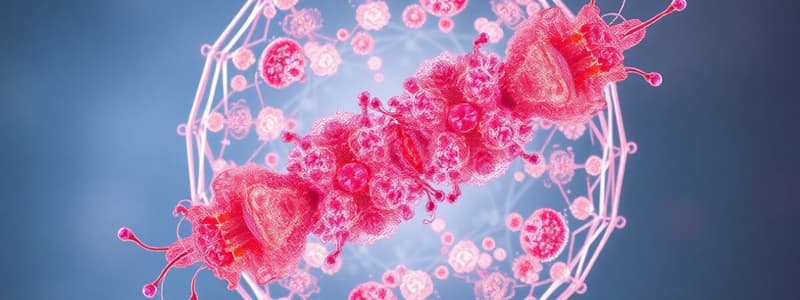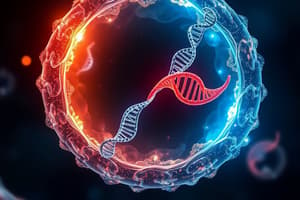Podcast
Questions and Answers
What is one primary function of cell division in multicellular organisms?
What is one primary function of cell division in multicellular organisms?
- To produce unique genetic combinations
- For energy production
- To eliminate old cells
- For growth and repair (correct)
What distinguishes meiosis from other forms of cell division?
What distinguishes meiosis from other forms of cell division?
- It does not involve chromosome duplication
- It occurs in somatic cells only
- It results in daughter cells with identical DNA
- It produces sperm and egg cells (correct)
What do eukaryotic chromosomes consist of during cell division?
What do eukaryotic chromosomes consist of during cell division?
- Chromatin (correct)
- Ribosomes
- Nucleotides
- Plasmids
How many sets of chromosomes do somatic cells have?
How many sets of chromosomes do somatic cells have?
What term describes the characteristic number of chromosomes for each species?
What term describes the characteristic number of chromosomes for each species?
Flashcards
Cell Division in Unicellular Organisms
Cell Division in Unicellular Organisms
Cell division in unicellular organisms creates new, identical organisms.
Cell Division in Multicellular Organisms
Cell Division in Multicellular Organisms
Cell division allows multicellular organisms to grow, repair tissues, and develop from a single cell.
Daughter Cells
Daughter Cells
The new cells created from cell division, usually genetically identical.
Meiosis
Meiosis
Signup and view all the flashcards
Chromosomes
Chromosomes
Signup and view all the flashcards
Chromatin
Chromatin
Signup and view all the flashcards
Somatic Cells
Somatic Cells
Signup and view all the flashcards
Gametes vs somatic cells
Gametes vs somatic cells
Signup and view all the flashcards
Study Notes
Cell Division in Unicellular Organisms
- Cell division reproduces the entire organism.
Cell Division in Multicellular Organisms
- Essential for development from a fertilized cell.
- Crucial for growth.
- Necessary for repair.
- Typically produces daughter cells with identical genetic information (DNA).
- Meiosis is an exception, producing sperm and egg cells.
Chromosomes
- DNA molecules in a cell.
- Eukaryotic chromosomes consist of chromatin: a complex of DNA and protein.
- Chromatin condenses during cell division.
- Each species has a specific number of chromosomes.
Somatic Cells vs. Gametes
- Somatic cells (body cells) have two sets of chromosomes.
- Gametes (sperm/eggs) have one set of chromosomes.
Studying That Suits You
Use AI to generate personalized quizzes and flashcards to suit your learning preferences.




